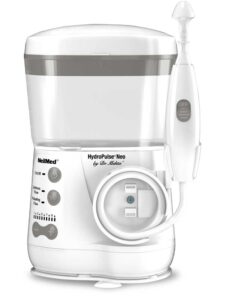Tinnitus Therapy using Transcranial Magnetic Stimulation – TMS
Not everyone responds to standard tinnitus therapy. For those who do not, a new form of therapy is available that is helping patients. It is the use of magnetic pulses over areas of the brain involved in tinnitus.
Transcranial Magnetic Stimulation (TMS) is a non-invasive, and relatively painless form of Brain Stimulation used to treat patients whose conditions have not improved through conventional approaches. This type of stimulation was discovered in 1985, with research conducted worldwide on treatments for numerous brain illnesses including depression and tinnitus.
What is done:
During the TMS procedure, a magnetic coil is placed over the patient’s head, which delivers a pulsed magnetic field to precisely targeted brain areas. By activating or inhibiting specific areas of the brain, TMS can heal brain function over time. After a full course of treatment, patients notice a significant reduction in symptoms that often continues after the end of the treatment course.
Common side effects, which are minimal, may include mild scalp irritation and headache. These usually subside within a week of starting treatment. With TMS there is no anesthesia involved and no memory side effects. In fact, there is usually some degree of cognitive enhancement associated with the procedure. After a TMS treatment, patients continue their normal daily activities without difficulty.
FDA approved TMS to treat major depression in 2008. More applications are being reported including use in a wide range of brain disorders including generalized anxiety, chronic pain, post-traumatic stress disorder, tinnitus and others.
Tinnitus causes a person to perceive continuous phantom sounds. Often the loudness and consistency of tinnitus can be debilitating. Not a psychological condition in itself, tinnitus can worsen when sufferers are in a stressful situation, and depression often follows tinnitus as patients become hopeless of alleviating their condition.
A complete tinnitus evaluation to rule out specific causes is done before TMS.
Several recent peer-reviewed research studies have found TMS to be beneficial in reducing tinnitus symptoms. In the 2008 study Combined temporal and prefrontal transcranial magnetic stimulation for tinnitus treatment: A pilot study by Kleinjung et. at. it was found at 3 month follow-up that a remarkable benefit persisted from the use of combined prefrontal and temporal rTMS treatment. In the 2012 paper Effectiveness of Theta-Burst Repetitive Transcranial Magnetic Stimulation for Treating Chronic Tinnitus by Chung et. al. theta-burst TMS, another form of non-invasive stimulation was explored as a method of modulating tinnitus. In this study, 75% of subjects receiving active stimulation reported suppression of their tinnitus following theta-burst TMS. The 2012 study by Lehner, et. al, Multisite rTMS for the Treatment of Chronic Tinnitus: Stimulation of the Cortical Tinnitus Network—A Pilot Study further supports the initial findings of the above mentioned Kleinjung study.
Dr William F Stubbelman is performing Transcranial Magnetic Stimulation at his clinic in Los Angeles. In addition to the regular TMS equipment, he has developed recording and enhancing devices that enable a precise treatment. He has found that the treatment needs to be for reducing activity on one hand, and enhancing brain function on the other hand.
Of interest is that after each treatment there is a period of brain enhancement (cognitive enhancement). This gives Dr Stubbeman an opportunity to reinforce the therapy with therapeutic inputs.
Dr. William Stubbeman will be speaking at this month’s American Tinnitus Association’s Orange County Tinnitus Support Group Meeting. It will be held on Saturday, April 6, 2013 from 1:00 – 3:00 p.m. at the Mariposa Women and Family Center at
812 W. Town and Country Rd. Orange, CA 92868
For more information visit:
www.Drstubbeman.com
http://www.ata.org/node/1528
His office is at 11800W. Olympic Blvd. Suite 441
Los Angeles, Ca 90064 Phone 310 386 3955
References
Chung,H.K., Tsai,C.H., Lin,Y.C., Chen, J.M.,Tsou,Y.A., Wang,C.Y., Lin, C.D., Jeng,F.C., Chung,J.G., and Tsai,M.H. (2011). Effectiveness of theta-burst repetitive transcranial magnetic stimulation for treating chronic tinnitus. Audiol.Neurootol. 17, 112–120.
Kleinjung,T.,Eichhammer, P., Landgrebe,M., Sand,P., Hajak,G., Steffens, T., Strutz,J., and Langguth, B. (2008).Combined temporal and prefrontal transcranial magnetic stimulation for tinnitus treatment: a pilot study. Otolaryngol. HeadNeck Surg. 138, 497–501.
Lehner, A., Schecklmann, M., Poeppl, T.B., Kreuzer, P.M., Vielsmeier, V., Rupprecht, R, Landgrebe, M, Langguth, B. (2012). Multisite rTMS for the Treatment of Chronic Tinnitus: Stimulation of the Cortical Tinnitus Network—A Pilot Study. Brain Topogr. 2012 Dec 11. [Epub ahead of print]

